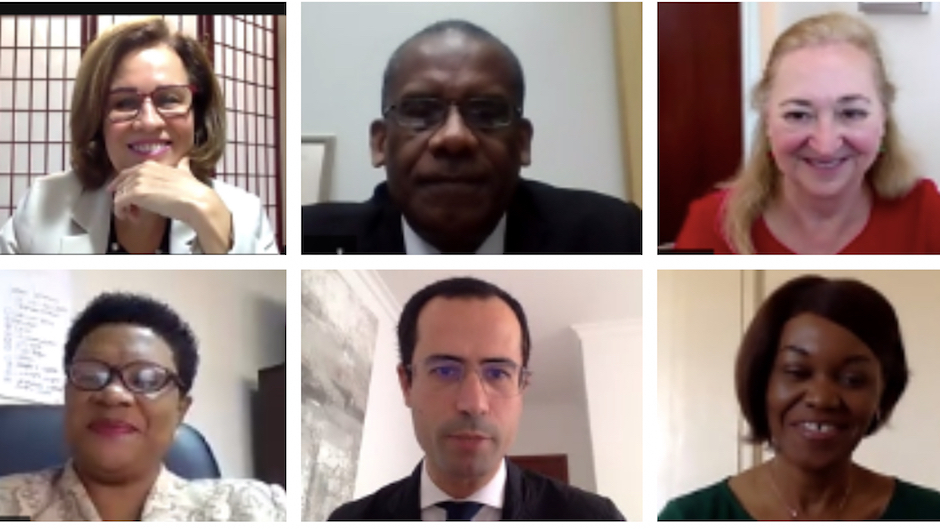A hemispheric collaboration between the Pan American Health Organization/World Health Organization (PAHO/WHO) and PAHO/WHO Nursing Collaborating Centres at the University of Miami and University of the West Indies has resulted in a new course to develop nurse leaders in Jamaica.
The launch of the PAHO Virtual Training on Nursing and Midwifery Leadership, a 20-week curriculum offered through the Virtual Campus of Public Health, was celebrated via Zoom on November 30.
“Amid this unprecedented pandemic, the timing is critical for a course that will offer a clear and accessible path to transformational leadership for nurses in the Caribbean,” said Dean Cindy L. Munro, UM School of Nursing and Health Studies (SONHS).
In addition to Dr. Munro, invited speakers at the official launch included Dr. Bernadette Theodore-Gandi, PAHO/WHO representative in Jamaica; Dr. Tomlin Paul, dean of the Faculty of Medical Sciences at the University of the West Indies, Mona; and Mr. Dunstan Bryan, Permanent Secretary, Ministry of Health and Wellness (MOHW), Jamaica.
Dr. Silvia Cassiani, PAHO/WHO regional advisor on Nursing and Allied Health Personnel, gave a presentation on the state of nursing in the region, and Patricia Ingram-Martin, chief nursing officer for Jamaica’s MOHW, offered closing remarks. Mr. Casimiro Dias, PAHO/WHO Health Systems and Services advisor, served as moderator.
Also in attendance via Zoom were faculty mentors from SONHS and the University of the West Indies School of Nursing (UWISON), as well as the inaugural cohort of 32 students from UWISON who started the course on November 18.
Faculty mentors for the course include, from SONHS, Drs. John Clochesy, Nichole Crenshaw, Mary Hooshmand, Johis Ortega, and Kenya Snowden, and from UWISON, Sheryl Garriques-Lloyd, Verona Henry-Ferguson, Kadene Leslie, Mauvette Waite, and Veronica Waugh-Brown. These experienced nurse educators have met regularly via Zoom to review and customize course content to the needs of Jamaica’s nurse leaders and provide insights on each training module. Their aim is to create a supportive, small group tutoring environment for participants.
Calling the University of the West Indies “a truly amazing partner," Munro emphasized the significance of building their hemispheric alliance in the spotlight of the WHO-designated Year of the Nurse and the specter of COVID-19. The course will empower nurses and midwives in the Caribbean region, she said, by “enhancing understanding of nursing leadership and management principles that can be employed in clinical practice.”
Munro opened the course's nurse leadership webinar series with a 45-minute Zoom presentation on December 14, addressing strategies for successful nurse leadership in a “VUCA” world. VUCA, which stands for Volatility, Uncertainty, Complexity, and Ambiguity, she explained, was originally coined by the Army War College to describe precarious political climates but can easily be applied to today’s pressing health care predicament.
“If complexity doesn’t describe our current environment, I don’t know what would,” Munro said.
While nursing and higher education require managing a great deal of complexity even in non-VUCA times, she noted that VUCA environments, in particular, call for leaders to explore multiple options and strategies—to embrace the word "and" and identify win-win opportunities, rather than limit their mindset to “either/or" choices or zero-sum games in decision-making.
“VUCA environments require a lot of cooperative effort to enhance the resources we have to share,” said Munro. “Seek to have cooperative win-win solutions that can move you and your organization forward in a way that protects you not only in the VUCA world but makes you more successful in the new normal that follows.”
According to Munro, agility is another key to success in a VUCA world. “You have to be able to test and learn, and say, ‘OK, we're going to change to a different strategy,’” she said. At the same time, she pointed out, agility is most effective when bolstered by a “backbone” of stability.
Offering the example of how SONHS pivoted in the wake of COVID-19, Munro said, “We were left, as many institutions were, with teaching our students remotely with very, very little prior notice.” Although the school’s emergency response plan had been developed with natural disasters like hurricanes front of mind, it provided the critical foundation SONHS needed to rapidly realign and reorient a wide range of resources and services in the pandemic. “The goal of any leader," concluded Munro, "is to build that stability into the organization so you are ready to roll when the VUCA situation comes along.”

